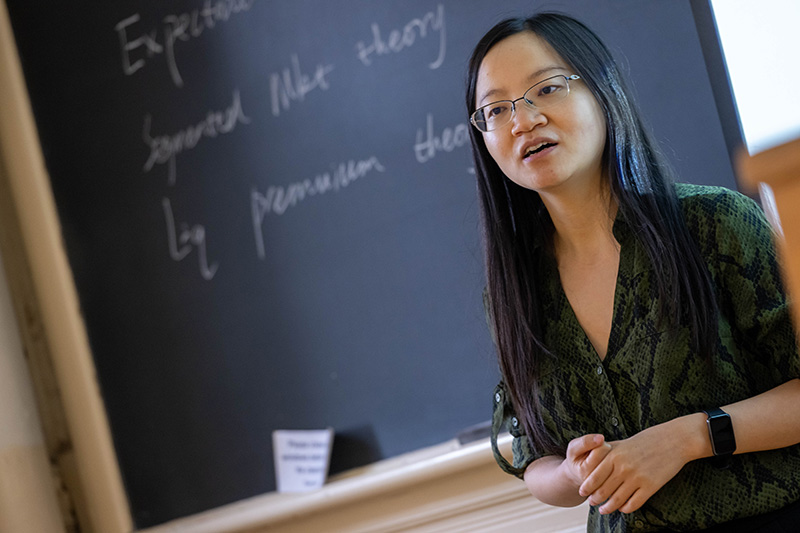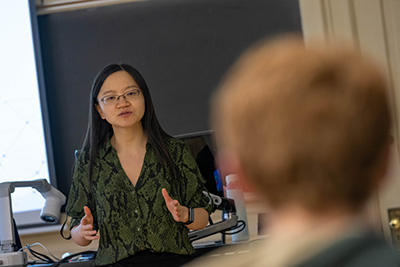
Assistant Professor of Financial Economics Jinjing Liu brings her research and experience at the World Bank into the classroom.
Driven by her talent for mathematics and a passion for meaningful impact, Jinjing Liu discovered her calling in financial economics. Combining analytical precision with real-world problem-solving, Liu has crafted a career that bridges academic excellence, practical applications, and student empowerment.
Now an assistant professor of financial economics at Moravian University, Liu uses her expertise to prepare students for future careers by teaching courses in investments, managerial finance, money and banking, and behavioral finance.
A Journey Rooted in Education and Transformation
Inspired by her father’s influential teaching career, Liu always knew she wanted to follow a similar path—but the question was, in what field? While earning her undergraduate degree in statistics from Anhui University in Hefei, China, Liu quickly realized her mathematical strengths. However, she also identified the limitations of pure statistics, leading her to explore the areas of economics and finance, where she ultimately found the perfect outlet to apply her quantitative skills to real-world challenges.
Liu’s career reached a turning point during her time at the World Bank in Washington, DC, where she worked as a research consultant. In this role, she supported data-driven decision-making processes by analyzing the credibility of potential borrowers and assessing economic risks.
This experience bridged the gap between theory and practice, allowing Liu to witness how quantitative models and data analysis directly impact global lending decisions. Today, she incorporates these insights into her teaching, helping students grasp the practical applications of economics and finance, from investment analysis to risk management.
Researching Extreme Scenarios
While pursuing her doctorate in financial economics at McGill University in Montreal, Liu delved into the concept of tail risk—the probability and impact of rare, extreme events, such as the 2008 global financial crisis. These events, though infrequent, can profoundly affect investments and the economy.
Her research focused on developing models to better estimate the damage such events could cause, equipping professionals with tools to assess and prepare for catastrophic risks. This work aligns with her current, broader research interests, which include executive compensation, banking, asset pricing, and risk management. Liu’s research has been widely recognized and featured in distinguished publications such as Journal of Financial Econometrics and Fordham Journal of Corporate and Financial Law.
Preparing Students for Success
Joining Moravian University’s esteemed business school, Liu found a platform to integrate her research and industry experience into her teaching. Her courses emphasize practical skills, from understanding stock and bond pricing to constructing diversified investment portfolios.
One of her focal teaching areas is investment analysis, in which she highlights the importance of tailoring financial models to specific industries. “An investment in AI is different from an investment in banking,” Liu says. “You need to understand the unique characteristics of each industry and adjust your approach accordingly.”

Liu also uses her research on executive compensation to enrich classroom discussions. She guides students in analyzing CEO compensation practices to evaluate fairness, identify conflicts of interest, and understand their implications for shareholder wealth and corporate value.
For Liu, the true measure of success lies in her students’ achievements. Watching them excel in exams, secure jobs in the financial economics sector, and pursue advanced degrees affirms the value of her teaching. She takes pride in equipping her students with the knowledge and skills they need to navigate the complexities of economics and finance confidently—ensuring they are ready to tackle challenges, seize opportunities, and thrive in a dynamic global economy.
“If you have a student who publishes well or lands a great job, it means you’ve taught them well. That’s one of the greatest rewards of being an educator,” Liu says.